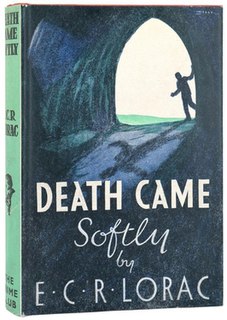
Death Came Softly is a 1943 detective story by E.C.R. Lorac, the pen name of the British writer Edith Caroline Rivett. It was the twenty third entry in her long-running series featuring Chief Inspector MacDonald of Scotland Yard.

Fire in the Thatch is a 1946 detective novel E.C.R. Lorac, the pen name of the British writer Edith Caroline Rivett. It is the twenty seventh in her long-running series featuring Chief Inspector MacDonald of Scotland Yard. Originally published by Collins Crime Club, it was reissued in 2018 by the British Library Publishing as part of a group of crime novels from the Golden Age of Detective Fiction.
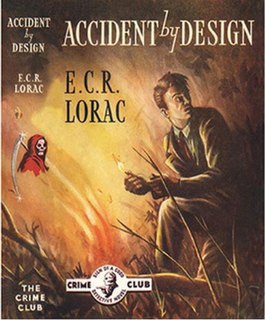
Accident by Design is a 1950 detective novel by E.C.R. Lorac, the pen name of the British writer Edith Caroline Rivett. It is the thirty fourth in her long-running series featuring Chief Inspector MacDonald of Scotland Yard. Like a number of Lorac's works it takes the form of a country house mystery, a popular branch of the genre during the Golden Age of Detective Fiction. Maurice Richardson in an review in The Observer wrote "The usual carefully constructed, rural family murder case which we expect from this eminently trustworthy exponent of the English school of whodunnit."
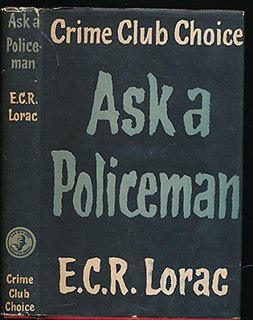
Ask a Policeman is a 1955 detective novel by E.C.R. Lorac, the pen name of the British writer Edith Caroline Rivett. It is the forty first in her long-running series featuring Chief Inspector MacDonald of Scotland Yard. Published by the Collins Crime Club, the title references the popular music hall song Ask a Policeman.
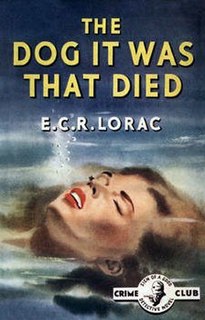
The Dog It Was That Died is a 1952 detective novel by E.C.R. Lorac, the pen name of the British writer Edith Caroline Rivett. It is the thirty sixth in her long-running series featuring Chief Inspector MacDonald of Scotland Yard, one of the more conventional detectives of the Golden Age of Detective Fiction. It was published by the Collins Crime Club.

Crook O'Lune is a 1953 detective novel by E.C.R. Lorac, the pen name of the British writer Edith Caroline Rivett. It is the thirty eighth in her long-running series featuring Chief Inspector MacDonald of Scotland Yard, one of the more orthodox detectives of the Golden Age of Detective Fiction. It was published in the United States by Doubleday under the alternative title of Shepherd's Crook.

Part for a Poisoner is a 1948 detective novel by E.C.R. Lorac, the pen name of the British writer Edith Caroline Rivett. It is the thirty first in her long-running series featuring Chief Inspector MacDonald of Scotland Yard, one of the more conventional detectives of the Golden Age of Detective Fiction who relies on standard police procedure to solve his cases.. It was published in the United States by Doubleday under the alternative title of Place for a Poisoner.
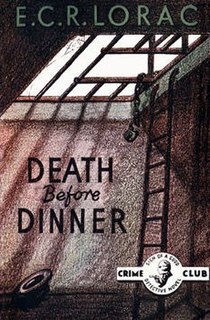
Death Before Dinner is a 1948 detective novel by E.C.R. Lorac, the pen name of the British writer Edith Caroline Rivett. It is the thirtieth in her long-running series featuring Chief Inspector MacDonald of Scotland Yard, one of the detectives of the Golden Age of Detective Fiction who relies on standard police procedure to solve his cases.. It was published in the United States by Doubleday under the alternative title of A Screen for Murder.

The Murder on the Burrows is a 1931 detective story by E.C.R. Lorac, the pen name of the British writer Edith Caroline Rivett. Her debut novel, it introduced the character of Chief Inspector MacDonald of Scotland Yard who went on to appear in a lengthy series of novels during the Golden Age of Detective Fiction. Although initially named James this is changed to Robert in later books. It takes around Bideford Bay in North Devon where the author had spent several holidays.

Shroud of Darkness is a 1954 detective novel by E.C.R. Lorac, the pen name of the British writer Edith Caroline Rivett. It is the thirty ninth in her long-running series featuring Chief Inspector MacDonald of Scotland Yard, one of the more orthodox detectives of the Golden Age of Detective Fiction.

Death at Dyke's Corner is a 1940 detective novel by E.C.R. Lorac, the pen name of the British writer Edith Caroline Rivett. It is the nineteenth in her long-running series featuring Chief Inspector MacDonald of Scotland Yard, a Golden Age detective who relies on standard police procedure to solve his cases.

The Sixteenth Stair is a 1942 detective novel by E.C.R. Lorac, the pen name of the British writer Edith Caroline Rivett. It is the twenty second in her long-running series featuring Chief Inspector MacDonald of Scotland Yard, a Golden Age detective who relies on standard police procedure to solve his cases.

Rope's End, Rogue's End is a 1942 detective novel by E.C.R. Lorac, the pen name of the British writer Edith Caroline Rivett. It is the twenty first in her long-running series featuring Chief Inspector MacDonald of Scotland Yard, a Golden Age detective who relies on standard police procedure to solve his cases. It takes the form of the country house mystery, popular during the era.

Murder on a Monument is a 1958 detective novel by E.C.R. Lorac, the pen name of the British writer Edith Caroline Rivett. It is the forty fifth in her long-running series featuring Superintendent MacDonald of Scotland Yard, one of the more conventional detectives of the Golden Age of Detective Fiction. Along with Murder in Vienna it was one of the rare ventures abroad for the series which generally took place in London and rural England. It was penultimate novel featuring MacDonald to be published during Lorac's lifetime.
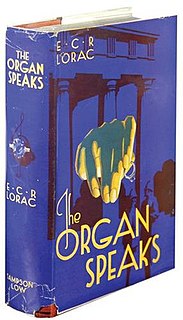
The Organ Speaks is a 1935 detective novel by E.C.R. Lorac, the pen name of the British writer Edith Caroline Rivett. It is the eighth book featuring Chief Inspector MacDonald of Scotland Yard who appeared in a lengthy series of novels during the Golden Age of Detective Fiction.

Death of an Author is a 1935 detective novel by E.C.R. Lorac, the pen name of the British writer Edith Caroline Rivett. It is a rare standalone book by Lorac, not featuring Chief Inspector MacDonald of Scotland Yard who appeared in a lengthy series of novels during the Golden Age of Detective Fiction. It was her final novel published by Sampson Low before she switched to the more prestigious Collins Crime Club with whom she remained for the rest of her career.
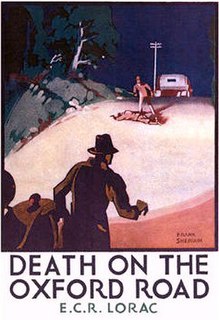
Death on the Oxford Road is a 1933 detective novel by E.C.R. Lorac, the pen name of the British writer Edith Caroline Rivett. It is the fifth book featuring Chief Inspector MacDonald of Scotland Yard who appeared in a lengthy series of novels during the Golden Age of Detective Fiction.

Murder in Chelsea is a 1934 detective novel by E.C.R. Lorac, the pen name of the British writer Edith Caroline Rivett. It is the seventh book featuring Chief Inspector MacDonald of Scotland Yard who appeared in a lengthy series of novels during the Golden Age of Detective Fiction.

A Pall for a Painter is a 1936 detective novel by E.C.R. Lorac, the pen name of the British writer Edith Caroline Rivett. It is the tenth in her long-running series featuring Chief Inspector MacDonald of Scotland Yard, a Golden Age detective who relies on standard police procedure to solve his cases.
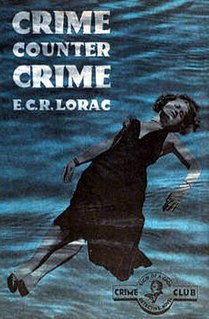
Crime Counter Crime is a 1936 detective novel by E.C.R. Lorac, the pen name of the British writer Edith Caroline Rivett. It is the ninth in her long-running series featuring Chief Inspector MacDonald of Scotland Yard, a Golden Age detective who relies on standard police procedure to solve his cases. It was her first novel published by Collins Crime Club after switching from Sampson Low, partly on the success of the previous entry in the series The Organ Speaks. Collins then published the remainder the series.




















